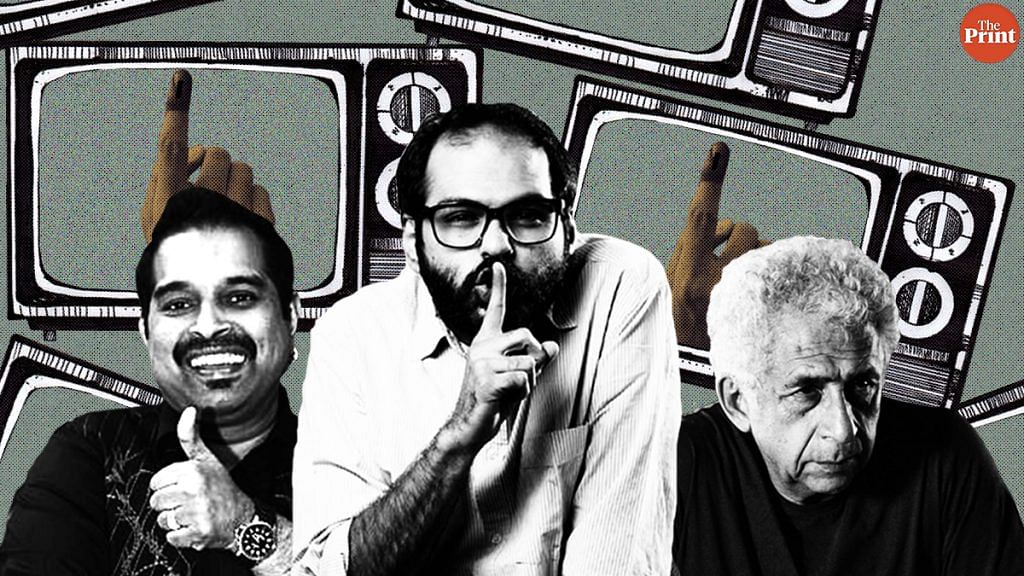Nine hundred artistes including Vivek Oberoi and Shankar Mahadevan have appealed to Indians to vote for PM Narendra Modi and a “majboot” government. This comes a week after 600 theatre personalities came together and urged people to “vote BJP and its allies out of power”. Now, leading Indian economists, including Gita Gopinath and Raghuram Ranjan, have written anti-Modi government essays for a forthcoming book.
ThePrint asks: Is it good for Indian democracy when artistes, celebs & economists endorse parties as groups?
It is one thing to tell your fans what shampoo to use, and quite another to tell them who to vote for
Associate Editor, ThePrint
Before the 2014 Lok Sabha elections, Salman Khan was flying kites with the then Gujarat CM Narendra Modi, endorsing him as a “good man” and giving a thumbs up to the much-touted Gujarat model of development. But whether it was his naiveté or a slip of tongue, during the press interaction he indicated that while he is endorsing Modi, he will vote for Congress’ Priya Dutt from Bandra.
This is a glimpse of what happens when actors and other well-known personalities publicly endorse a certain political group. They carry influence, but one doesn’t know what they really think.
Moreover, their area of expertise may be entertainment or economics,
or something else, but that does not mean they are any more qualified than an average voter to talk about why a political group is better than the other.
It belittles democracy when celebrities ask voters to chose a particular candidate simply because they believe in him, rather than urging them to look at candidates’ record, the work he or she has done, what the ideology of the political party stands for and so on. It is one thing to tell your fans what shampoo to use, and quite another to tell them who to vote for.
Every citizen, including actors, economists and other well-known personalities have the right to voice their choice in whatever manner they choose. The problem begins when they use their fame or position in society to do so, at times even for commercial gains.
Also, the line between simply voicing one’s opinion and doing so as endorsements is very thin and often invisible to people.
A healthy democracy would not only give space to but also encourage such participatory movements
Journalist, ThePrint
Celebrities campaigning for political parties and candidates of their choice isn’t particularly new. We saw a barrage of celebrities coming forward to support Narendra Modi before the 2014 elections. What is, however, a relatively new and rather refreshing phenomenon is working individuals choosing to come forward in groups and taking a stand. Whatever their position may be, it shows two things. One, their ability to rally together and show solidarity for something they believe in as a collective. And two, contrary to all evidence, they do indeed have a spine.
This is a welcome move because politics pervades every aspect of our lives—the personal and the professional. Which is why the “apolitical”, “this doesn’t affect me” and “indifferent” attitude simply doesn’t cut it. That Bollywood and other professions are finally beginning to see it, is great.
A healthy democracy would not only give space to, but also encourage such participatory movements. I’d personally argue we are far from one—with activists, artists and others facing nothing short of death and rape threats when they choose to take a political stand. This also becomes a fig leaf behind which actors often hide—“we don’t take political positions because of the violent consequences”.
But that some are choosing to speak up despite all the possible repercussions means we are moving in the right direction.
Also read: Bollywood stars and their readymade support base: Why Indian politics can’t do without them
Move is welcome, but more and more people are shying away from voicing opinions publicly
Associate Editor, ThePrint
I don’t see anything wrong with artistes and celebrities coming together and raising their voices collectively over issues they build consensus on. Whatever might be the final view of such a group, it has its intrinsic value for democracy for several reasons. Artistes and celebrities are influencers. Those in Bollywood command more power to influence than others. Singers, poets, painters, authors largely fall in the category of people others listen to or want to know more about.
These groups airing an opinion on an issue collectively create a pressure group of influencers. And I believe that while individual voices can easily be smothered, a collective raising of issues is difficult to ignore.
Although one would expect such a group to raise issues concerning the nation, one cannot grudge them their freedom to express themselves on issues which concern them. And why not?
Such a group is welcome in any democracy, but I see more and more such persons shy away from making their opinion heard publicly. They prefer to remain apolitical and detached.
The stereotype that artistes don’t need to have a political opinion needs to be done away with
Madhavi Pothukuchi
Senior web editor
Celebrities, artistes and economists are important influences in Indian society. They influence what we say, how we dress, and our world view is in general. So why not with politics as well? There is also the stereotype that artistes don’t need to have a political opinion, which needs to be done away with. They are citizens of the country, with every right to comment on how the country is being run.
So, yes, I think it is good for Indian democracy when they endorse parties. Additionally, they provide different perspectives to the political debate, which is great — not because it’s just another perspective, but also because they can encourage youngsters to take a more active interest in politics and government.
